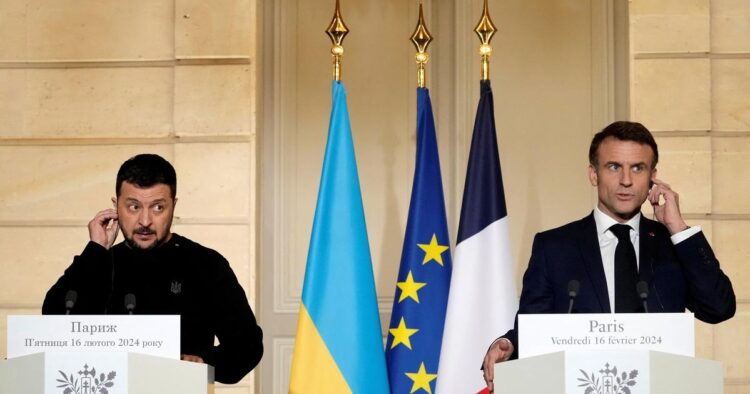In a significant move to bolster Ukraine’s defense capabilities, Ukrainian President Volodymyr Zelensky signed a 10-year bilateral security agreement with France in Paris, following a similar agreement with Germany earlier the same day. These agreements come as Ukraine continues to seek Western support nearly two years into Russia’s full-scale war.
President Zelensky’s visit to the Elysee presidential palace in Paris was met with a warm welcome from French President Emmanuel Macron. The security agreement with France includes a substantial package worth 3 billion euros ($3.2 billion) in military aid for this year, marking the largest annual contribution from France since the onset of the conflict.
President Macron emphasized the significance of Ukraine’s battle against Russian aggression, stating that the outcome would greatly impact the interests, values, security, and societal model of both France and Europe. He stressed the necessity of increased investment to support Ukraine over the long term.
The bilateral security agreements are aimed at providing a clear message of solidarity and commitment to Ukraine’s defense. Germany, in its agreement with Ukraine, pledged an additional 1.1 billion euros ($1.2 billion) in military aid, including crucial equipment such as howitzers, artillery ammunition, and air-defense systems.
Chancellor Olaf Scholz of Germany described the agreements as a “historic step,” emphasizing Berlin’s commitment to supporting Ukraine’s security. The agreements also highlight the intention of both France and Germany to provide sustained military support to Ukraine for the next decade.
In addition to military aid, the agreements underscore the importance of Ukraine’s ongoing reform efforts, crucial for its aspirations to join the European Union and NATO. They also outline plans for swift and sustained security assistance in the event of future Russian aggression, including economic measures against Russia.
The commitments made by France and Germany follow similar pledges by other Western allies, including the Group of Seven, which vowed increased military support for Ukraine at a NATO summit in Vilnius. These agreements aim to strengthen Ukraine’s defense capabilities and deter further aggression from Russia.
President Zelensky’s upcoming participation in the Munich Security Conference signals continued efforts to garner international support. He is scheduled to meet with various world leaders, including U.S. Vice President Kamala Harris, to discuss further avenues of cooperation in addressing the ongoing conflict.
Despite efforts from European allies, the approval of a $60 billion aid package for Ukraine faces resistance from House Republicans in the United States. German Chancellor Scholz has urged Congress to release the funding, emphasizing the crucial role of U.S. support in safeguarding Ukraine’s security.
Germany and France have emerged as key suppliers of military aid to Ukraine, with ongoing commitments to provide essential equipment and ammunition. President Zelensky expressed confidence in continued American support, stressing the importance of a pragmatic approach to uphold global security.
Overall, the bilateral security agreements between Ukraine, France, and Germany mark a significant step in strengthening Ukraine’s defense capabilities and solidifying Western support in the face of ongoing conflict with Russia.

















Comments